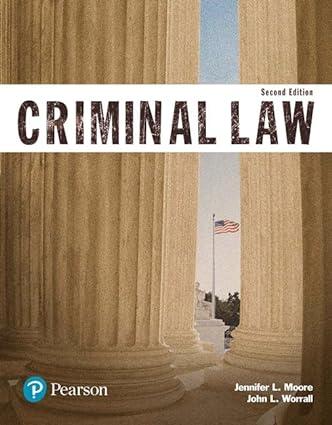Question
Introduction : An individual or a corporation can be charged with and convicted of a crime. For a corporation to be held criminally liable for
Introduction: An individual or a corporation can be charged with and convicted of a crime. For a corporation to be held criminally liable for the acts of an employee, the prosecutor must show that (1) the employee was acting within the scope of employment; (2) the employee was acting with the purpose of benefiting the corporation; and (3) the act was imputed to the corporation.
Concept Review: Corporate executives may be personally liable for a business crime. Under the "Responsible Corporate Officer" doctrine, a court may assess criminal liability on a corporate executive or officer even if they did not engage in, direct, or know about a specific criminal violation.
Case: Please read CASE 6-3: United States v. Park., 421 U.S. 658 (1975):
FACTS: Defendant Park, the president of a national food-chain corporation, was charged, along with the corporation, with violating the Federal Food, Drug, and Cosmetic Act by allowing food in the warehouse to be exposed to rodent contamination. Park had conceded that his responsibility for the "entire operation" included warehouse sanitation, but he claimed that he had delegated the responsibility for sanitation to dependable subordinates. He admitted at trial that he had received a warning letter from the Food and Drug Administration regarding the unsanitary conditions at one of the company's warehouses. The trial court found the defendant guilty. The court of appeals reversed. The case was appealed to the U.S. Supreme Court.
ISSUE: Can corporate executives be criminally liable for failing to ensure a company's compliance with the law?
REASONING: The Supreme Court has noted that the only way corporations can act is through their individual employees. The act in question, the Federal Food, Drug, and Cosmetic Act, requires stringent, affirmative actions on the part of corporate executives, but these standards are justified by the public interest in food safety. We expect executives such as Park to exercise appropriate authority and demonstrate supervisory responsibility. There is considerable evidence that Park had a duty to ensure sanitary conditions and that he violated that duty by failing to ensure that those to whom he delegated responsibility did their jobs. The Court said: "[T]he requirements of foresight and vigilance imposed on responsible corporate agents are beyond question, demanding, and perhaps onerous, but they are not more stringent than the public has a right to expect of those who voluntarily assume positions of authority in business enterprises whose services and products affect the health and well-being of the public that supports them.'
DECISION AND REMEDY: The U.S. Supreme Court reversed the appellate court's reversal of the trial court's conviction, finding that corporate executives can be criminally liable for failing to ensure a company's compliance with the law.
SIGNIFICANCE OF THE CASE: This case signaled to corporate officials that they could no longer use ignorance as a defense, because a court will hold high-level corporate actors responsible for their company's failure to comply with the law, even if they were unaware of what was going on within their company.
Question:
- Critical Thinking Question: Given the rule laid down in this case, could the defendant have presented any evidence that would have led to a different decision? With reference to Exhibit 1-1 (see below), which Purpose of the Law is fulfilled by the responsible corporate officer doctrine? Please define the responsible corporate officer doctrine as part of your original comment.

Exhibit 1-1 Purposes of the Law Providing order such that one can depend on a promise or an expectation of obligations. Serving as an alternative to fighting. Facilitating a sense that change is possible, but only after a rational consideration of options. Encouraging social justice. Guaranteeing personal freedoms. Serving as a moral guide by indicating minimal expectations of citizens and organizations.
Step by Step Solution
There are 3 Steps involved in it
Step: 1
ANSWER The responsible corporate officer doctrine also known as the Park doctrine holds corporate executives personally liable for violations of certa...
Get Instant Access to Expert-Tailored Solutions
See step-by-step solutions with expert insights and AI powered tools for academic success
Step: 2

Step: 3

Ace Your Homework with AI
Get the answers you need in no time with our AI-driven, step-by-step assistance
Get Started


